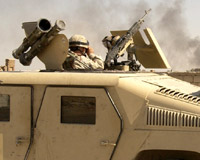CARC Paint

CARC (Chemical Agent Resistant Coating) is a paint used on military vehicles to make metal surfaces highly resistant to corrosion and penetration of chemical agents.
Inhaling CARC during the painting and drying process can be harmful. Dry CARC poses no hazards, except during welding or sanding.
If you are concerned about exposure to CARC paint during your military service, talk to your health care provider or contact your local VA Environmental Health Coordinator to help you get more information from a health care provider.
How Veterans may have been exposed to CARC paint
Gulf War Veterans who painted combat vehicles and equipment during their military service may have been exposed to CARC paint or fumes without adequate respiratory protection.
Other Veterans who painted tanks, armored personnel carriers, and other motor pool equipment may have been exposed. Some civilian units and support units may have been exposed.
Learn more about exposure to CARC paint from the Army Public Health Center.
Health problems associated with CARC paint
Paint fumes present the most potential risk to users especially when CARC is spray painted, rather than applied with a brush or roller.
CARC paint contains several chemical compounds that can be hazardous when inhaled or exposed to the skin:
- Isocyanyte (HDI) – Highly irritating to skin and respiratory system. High concentrations can cause: itching and reddening of skin; burning sensation in throat and nose and watering of the eyes; and cough, shortness of breath, pain during respiration, increased sputum production, and chest tightness.
- Solvents – Inhaling high concentrations can cause coughing, shortness of breath, watery eyes, and respiratory problems, including asthma
- Toluene diisocyanate (TDI) – High levels released during the drying process can cause kidney damage.
Health concerns?
If you are concerned about health problems associated with exposure to CARC paint during your military service, talk to your health care provider or contact your local VA Environmental Health Coordinator to help you get more information from a health care provider.
VA offers a variety of health care benefits to eligible Veterans. Not enrolled in the VA health care system? Find out if you qualify for VA health care.
Compensation benefits for health problems
Veterans may file a claim for disability compensation for health problems they believe are related to exposure to CARC paint during military service. VA decides these claims on a case-by-case basis. File a claim online.
Learn more about VA benefits.




















